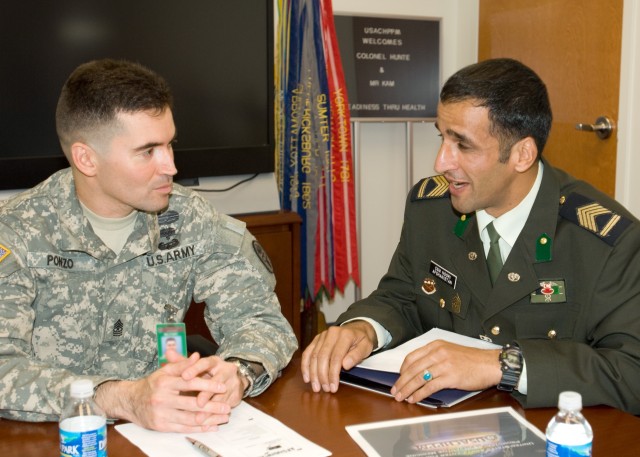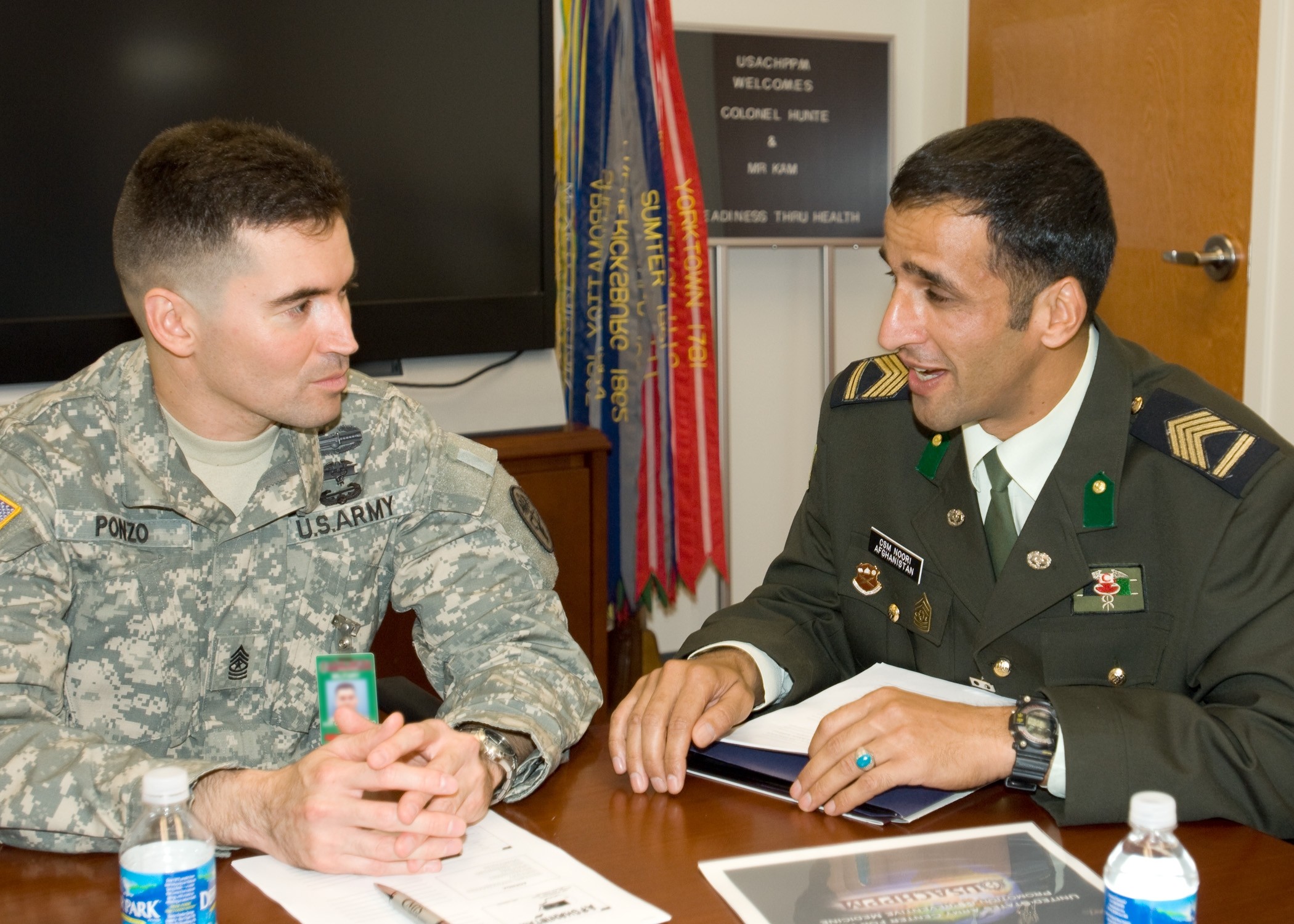It sounds like a medical NCO's professional dream-come-true - in the army five years, only 32 years old, and requested by name to be the command sergeant major at army medical headquarters.
The senior enlisted medic of the Afghan army is living that dream. And while it's not all a proverbial bed of roses, Command Sgt. Maj. Mohammed Shakir Noori finds himself possessed of the rare opportunity to build an organization from the ground up, set training and professional standards for his country's enlisted medical corps, and help make a real difference in the lives of Afghanistan's civilian population.
"When we started our army in 2003, we didn't have medics," Noori explained in an Aug. 8 visit to the U.S. Army Center for Health Promotion and Preventive Medicine at Aberdeen Proving Ground, Md. "Now, we have 2,000 medics [in an army of about 65,000], and an NCO academy in Kabul.
Noori said he has plans to further beef up NCO training opportunities on a model similar to that of the U.S. Army Medical Command.
His country, Afghanistan, is a country torn by decades of war. The fighting has damaged the medical infrastructure and left the civilian population with insufficient medical care and facilities. In Afghanistan, Noori said, the army treats civilians, too.
"When we started the army, we had one military hospital; the others were destroyed during the 13 years of war with the Soviets," he explained. "Now we have four regional hospitals constructed since 2002, and 22 military clinics, some operating and others to be completed by the end of 2008."
Noori came to the States to learn through the Army Medical Department Center and School's international military student program. He's completed coursework there and, with Oscar Ramos-Rivera, chief of the international training office, scheduled visits with the command sergeants major of U.S. Army Medical Command, Walter Reed and Brooke Army medical centers, and the U.S. Army Medical Research and Materiel Command.
Noori was educated in Pakistan, earning a degree as a physician assistant. He comes from a family with military connections-his father was an army colonel-and the normal expectation would have been that he too would be an officer.
However, he was approached to form and lead an enlisted medical corps and accepted the challenge. When he told his mother of his decision to do this, "she was ashamed," he said.
He explained that the reputation of the army's enlisted corps was not good at the time. Like any mother, his mother wanted her son to do well professionally, and she had initial doubts about his choice. Those doubts have been eased as Noori and the other Afghan NCOs have changed their image from one labeled with the demeaning moniker "little sergeants" to words in their language that mean "active, smart and strong."
At CHPPM, Noori met with Sgt. Maj. Osvaldo Ponzo and several CHPPM NCOs. Naturally interested in preventive medicine, Ponzo asked about injury, disease and environmental surveillance issues that Noori and his corps face.
Noori explained that specializing NCOs for preventive medicine duties is on his list, but currently junior officers perform basic preventive and health promotion functions.
"Preventive medicine is a priority, but the biggest problem we have is finding qualified candidates to serve in this field," Noori said. He added that retention also can be an issue because some provincial or local leaders may not yet support service in the national army. In Afghanistan, the tradition of local loyalties remains important.
Noori said he is grateful for U.S. Army assistance to his country, but eager to achieve a full strength, fully trained enlisted medical corps.
"Right now, the United States is here for us, helping us with training and other things so that we can do things very quickly," he said. "We should not just eat the fish, though, but learn to fish ourselves."
CHPPM's sergeant major sees benefit for both armies in the strengthening of relationships between their medical organizations.
"Joint medical efforts, whether direct medical care or force protection, will only better the health of our deployed forces in the CENTCOM AOR," Ponzo said. "Diseases and non-battle injuries do not discriminate in who they make ill. With the Afghan army preventive medicine program being stood up, I believe we will be able to maximize the health of coalition forces already operating in that area."
The two exchanged not just medical information but tokens of their corps: coins and pins.
Of the visit, Ponzo said, "It's personally rewarding seeing CSM Noori so on-point in how he envisions the concept of the Afghan army's preventive medicine and force health protection, and the noncommissioned officer's role in it taking shape."


Social Sharing